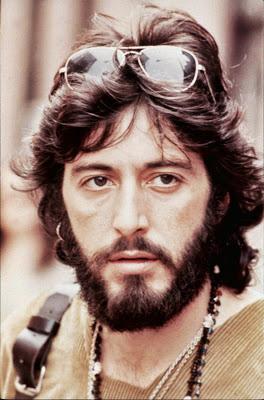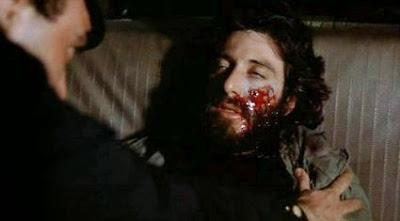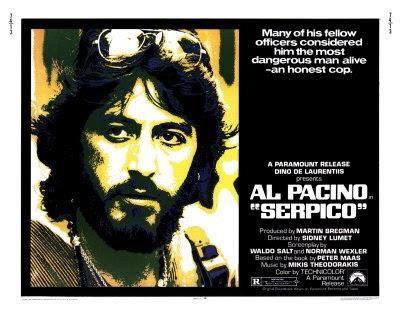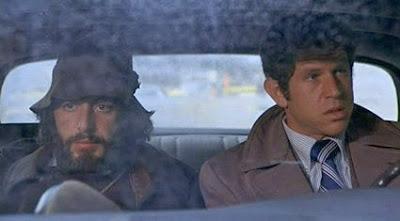
By Alex Simon
“Trumpet in a herd of elephants; / Crow in the company of cocks; / Bleat in a flock of goats.”—Mayan proverb.
“Frank, let's face it: who can trust a cop that won't take money?” –A fellow cop to Frank Serpico (Al Pacino)
In 1973, between the first two Godfather films, Al Pacino hung his hat on another iconic film and character of ‘70s cinema. Based on the true story of New York City Police Detective Frank Serpico, who in 1971 broke the code of silence unofficially understood by every cop to be sacrosanct and testified before the Knapp Commission, a government inquiry into NYPD police corruption. Serpico’s story quickly become big news, and a best-selling non-fiction book by Peter Maas. Sidney Lumet’s film of Serpico, written by celebrated screenwriters Norman Wexler and Waldo Salt, took the policier further into gritty new territory that had been forged two years earlier by William Friedkin’s The French Connection.

We meet Frank Serpico as a young police academy graduate, the son of proud Italian immigrants. Frank is ambitious, idealistic and a gentle soul at his core. Most importantly, we see that he holds the law up as being sacred. Immediately he gravitates toward a senior patrolman who is highly decorated, hoping he’ll show this rookie the ropes. And immediately we see that corruption trickles down to the very bottom of any organization. While eating at a local deli, Frank declines what is understood to be the day’s gratis meal for cops, instead ordering a roast beef sandwich. When the fatty food arrives, Frank goes to take it back, but is stopped by his new mentor, who patiently explains “We just kinda take what Charlie gives us.” It’s all downhill from there.
Frank quickly learns that the NYPD interrogates suspects via kidney punches and phone books to the head, and that police work is viewed as an entrepreneurial pursuit. Every time Frank transfers to a new precinct, hoping this time to be paired with some righteous cops, he is greeted with that week’s payoff envelope from local businesses, gangsters or whomever needs a “favor,” be it a parking ticket overlooked, or to the privilege of dealing heroin unmolested by the boys in blue.

The higher Frank rises in the department (his innovation in working plain clothes to blend in on the street is just one of the things that made Serpico an exemplary cop), the deeper the corruption seems to be. Even after making a friend (Tony Roberts) in the D.A.’s office who seems as committed as he is to battling corruption, Frank is met with blank stares and outright contempt by the higher-ups who resent his rocking the boat. And it’s here we come to realize what Serpico the film, and Serpico the character, are really all about.
The mid-1960s through the late 1970s was an explosion of popular non-conformity among the Baby Boom Generation, tossing aside what they viewed as outmoded and outdated values, styles and rituals that were relics of post-WW II rigidity. Frank Serpico soon replaced his clean-cut looks for long, flowing hair and beard, his perfectly pressed NYPD uniform with knife-edge creases for “street” clothes, listened to classical music and even (gasp!) reads books without pictures. His embracing of the hippie aesthetic gave him an intellectual curiosity that spat in the face of everything an enclosed power structure and subculture like a police force rails against. In fact, Serpico’s style is such an affront to the crew-cut, bow tie-wearing cops that surround him, one veteran cop makes the overtly hostile accusation to Serpico’s face that he must be gay. In addition to being one of the best cop movies ever made, Serpico might be the finest American film in history dealing with the subject of conformity and how, at the end of the day, few things are more American than the old adage “If you want to get along, go along.”

Al Pacino has spoken at length of the time he spent with the real Frank Serpico before, during and after the film was completed. Serpico wound up living in exile in Europe for years, as his life would have been in danger had he remained in the U.S. One day, Pacino worked up the courage and asked Serpico why he “ratted out” his fellow cops. Serpico replied: “Well Al, if I hadn’t, who would I have been when I listened to a piece of music?”
Serpico received two Academy Award nominations and won Al Pacino a Golden Globe for Best Motion Picture Actor -- Drama. It is available on DVD and Blu-ray from Paramount Pictures Home Video.
